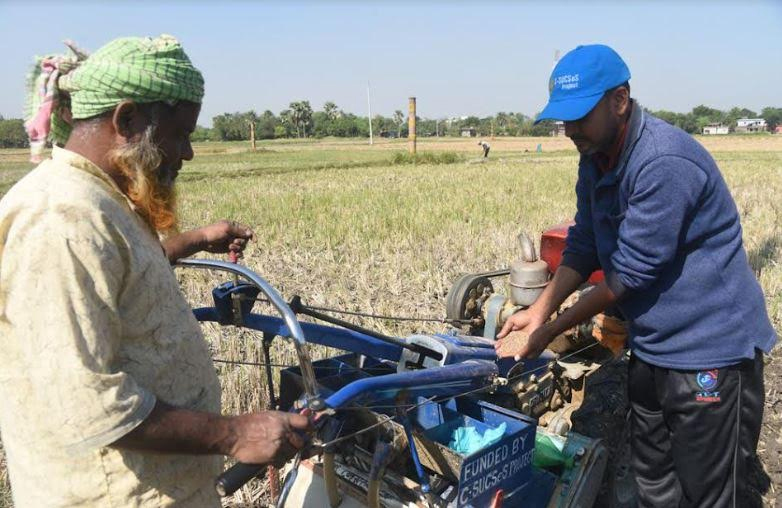News Flash

By Md Aynal Haque
RAJSHAHI, Feb 26, 2025 (BSS) - Shimul Islam, a farmer of Godagari in the
district, said the bed-planting technology has already started transforming
conventional agriculture into climate-resilient in the-region, particularly
in its vast Barind tract.
Terming the method as very demand-driven, he said by adding one simple and
inexpensive piece of equipment, they can cultivate their land in a single
pass instead of three to four separate cultivation processes in the
conventional system.
Since seeding and fertilizing are completed in one round through the machine,
the fertilizer is placed closely and systematically beside the seeds,
resulting in good crop yields.
Due to the bed system, wind can pass nicely and water cannot stay for long
and the process prevents damage to crops like wheat.
In their areas, farmers face challenges due to the high cost of cultivation
as three to four rounds of soil works are needed in conventional methods and
the cost of fertilizer and insect control materials is high. But, now the
sufferings have gone away amid promotion of the new technology.
Talking to BSS here Tuesday, Shimul mentioned that the bed planting
technology contributes to the timely and efficient growth of crops with fewer
rounds of soil work, reducing the vulnerability to natural calamities.
The bed formation also acts as a barrier, protecting crops from vertebrate
pests and weeds.
It safeguards crops from damage, making it an ideal choice for marginal
farmers.
Shimul said the farmers will be benefited enormously in terms of alleviating
the shortage of labor and enhancing food security if modern technologies are
expanded widely.
Managing irrigation in the undulating terrain of this region is challenging
due to the varying elevation of the soil, leading to issues related to
climate variability and a lack of surface water availability.
Traditionally, farmers in the region cultivate land using tractors and power
tillers. But, space needed for three to four rounds of traditional
cultivation results in additional labor and time.
The transformative technology is mitigating the unique challenges faced by
farmers due to climate change and setting a new standard for sustainable and
eco-friendly farming practices, officials said.
Apart from Shimul many farmers are adopting bed planting techniques during
this Rabi season which helped the farmers reduce irrigation water usage by 25
to 30 percent.
In order to manage the workload efficiently, the local service providers are
seen distributing some of the workloads to their assistant bed planters.
The technology not only ensures a more sustainable approach to agriculture
but also lights up the faces of those resilient farmers who persevere against
the odds.
Its success has sparked a growing interest among the local community,
highlighting its potential as a solution to longstanding agricultural
challenges.
With this breakthrough, farmers in this region are not only adapting to
climate change but also enhancing crop yield and sustainability.
Senior Scientific Officer of Bangladesh Agricultural Research Institute
(BARI) Dr Shakhawat Hossain told BSS that a groundbreaking agricultural
revolution is underway in the region through the innovative bed planting
technology.
On behalf of its 'Consortium for Scaling-up Climate-Smart Agriculture in
South Asia (C-SUCSeS) project', BARI has been promoting the technology
supported by the SAARC Agriculture Centre.
Dr Hossain said the project promoted a bed planter attached to a power tiller
for efficient soil tillage, bed formation, fertilizer application and seed
sowing in a single pass.
It's a smart method as it doesn't require any separate equipment meaning that
a single round of bed planting is sufficient curtailing the need for separate
seeding and fertilizing.
In this method, the machine featuring two types of furrow opener at the rear-
- one for seeds and the other for fertilizer-- is maintaining specific
distances for optimal growth.
Basically, the technology significantly reduces the workload and time
required for cultivation. Seeding cost is also much less than the
conventional seeding method.
Dr Hossain said they have generated local service providers by giving bed
planters for bed planting operations with the project interventions.
They are also enhancing the skills, marketing expertise and behavioral
changes of the local service providers.
"Some of them have gained expertise even from outside the country. As a
result, the service initiatives have positively inspired the local
entrepreneurs," the official said.
This year, they have given technological support to 200 small farmers,
including 60 females as demand for the service providers are gradually
increasing in the region, he added.